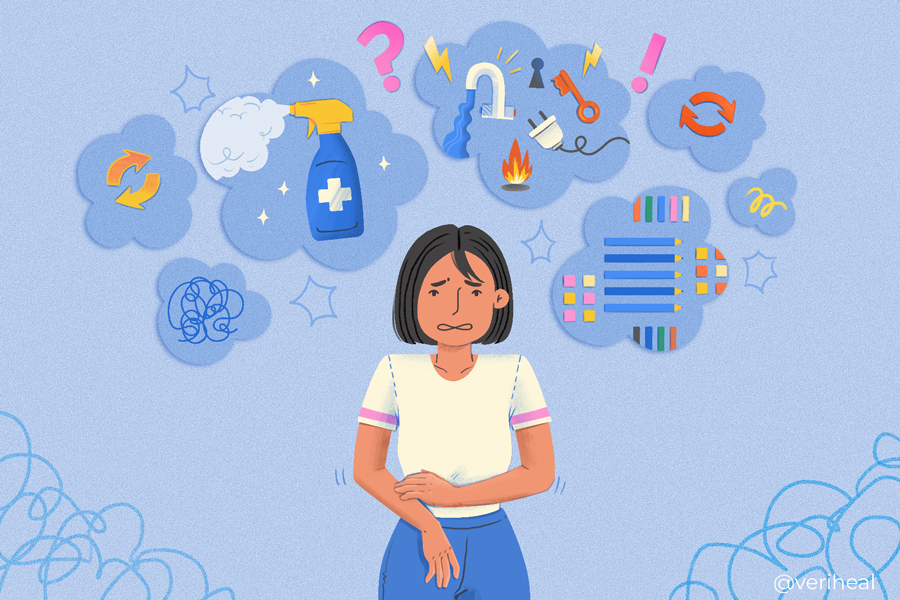Rumination OCD is a specific subtype of obsessive-compulsive disorder (OCD) that is characterized by persistent, intrusive thoughts and excessive worrying. These thoughts often revolve around fears, doubts, or uncertainties, and individuals with rumination OCD find it difficult to let go of these repetitive thoughts. If left unchecked, rumination OCD can interfere significantly with daily life and overall well-being.
Understanding Rumination OCD
Defining Rumination OCD
Rumination OCD is marked by a constant cycle of obsessive thinking and compulsive mental reviewing. Individuals with this condition tend to dwell on their thoughts, replaying them over and over again in their minds. They may become trapped in a loop of rumination, unable to break free from their worries and intrusive thoughts.
It is important to note that rumination OCD is different from regular rumination or overthinking. While everyone may experience occasional bouts of rumination, individuals with rumination OCD experience it to a debilitating extent. Their thoughts consume their daily lives, interfering with their ability to focus, make decisions, and engage in activities they once enjoyed.
The repetitive nature of rumination OCD can be exhausting and distressing. Individuals may feel overwhelmed by their thoughts, constantly seeking reassurance or engaging in mental rituals to temporarily alleviate their anxiety. However, these rituals only provide temporary relief and often reinforce the cycle of rumination.
The Psychology Behind Rumination OCD
The underlying psychological processes involved in rumination OCD are complex. Some theories suggest that it may be related to an overactive worry circuit in the brain, which causes individuals to excessively focus on potential threats or negative outcomes. This hyperactivity in the brain’s worry circuit can lead to a heightened sense of danger and an exaggerated perception of risk.
Furthermore, rumination OCD may be influenced by past traumatic experiences or a predisposition to anxiety. Traumatic events can leave a lasting impact on an individual’s mental health, making them more susceptible to developing obsessive thoughts and compulsive behaviors. Similarly, individuals with a history of anxiety may have a heightened sensitivity to stressors, making them more prone to rumination OCD.
Research has also shown that rumination OCD may be linked to certain cognitive biases. For example, individuals with rumination OCD may have a tendency to catastrophize, magnifying the potential negative consequences of their thoughts. They may also engage in black-and-white thinking, perceiving situations as either completely good or completely bad, without considering the gray areas in between.
Understanding the psychology behind rumination OCD is crucial for developing effective treatment strategies. By targeting the underlying mechanisms that contribute to rumination, therapists can help individuals regain control over their thoughts and break free from the cycle of rumination.
The Impact of Rumination OCD on Daily Life
Emotional Consequences of Rumination OCD
One of the most significant emotional consequences of rumination OCD is the experience of high levels of anxiety, stress, and discomfort. The constant bombardment of intrusive thoughts can leave individuals feeling overwhelmed and on edge. This can make it difficult to concentrate on daily tasks and can contribute to a sense of unease and restlessness.
In addition to anxiety, rumination OCD can also lead to feelings of guilt, shame, and self-doubt. Sufferers may question their own sanity or morality, as the intrusive thoughts often revolve around taboo or distressing subjects. These feelings can be incredibly distressing and can further exacerbate the emotional toll of the disorder.
Physical Health Implications of Rumination OCD
The impact of rumination OCD is not limited to emotional consequences; it can also have significant implications for an individual’s physical health. The constant rumination and accompanying anxiety can take a toll on the body, leading to a range of physical symptoms.
One common physical symptom experienced by individuals with rumination OCD is fatigue. The constant mental strain and lack of restful sleep can leave individuals feeling exhausted and drained. This can make it difficult to engage in daily activities and can further contribute to feelings of frustration and distress.
Insomnia is another physical health implication of rumination OCD. The intrusive thoughts and heightened anxiety can make it difficult for individuals to fall asleep or stay asleep throughout the night. This can lead to a cycle of sleep deprivation, which can further exacerbate the emotional and physical toll of the disorder.
In addition to fatigue and insomnia, individuals with rumination OCD may also experience headaches and muscle tension. The constant mental strain and heightened anxiety can cause tension to build up in the body, resulting in headaches and muscle aches. These physical symptoms can further contribute to the overall discomfort and distress experienced by individuals with rumination OCD.
It is important to address both the psychological and physical aspects of rumination OCD in order to effectively manage the disorder. Seeking professional help, such as therapy or medication, can provide individuals with the support and tools they need to cope with the emotional and physical consequences of rumination OCD.
Ketamine Infusion Therapy for Rumination OCD
What Is Ketamine Infusion Therapy?
Ketamine infusion therapy is an advanced medical procedure that entails the intravenous administration of ketamine, a dissociative anesthetic. This treatment has gained prominence for its swift-acting effects, particularly in addressing mental health conditions, as well as chronic pain.
Ketamine acts on specific receptors in the brain, promoting the formation of new neural connections associated with mood regulation and pain modulation. It is administered under careful medical supervision to ensure patient safety and optimal results.
Ketamine Infusion Therapy for Rumination OCD
Ketamine’s mechanism of action involves targeting the brain’s glutamate receptors, which play a pivotal role in mood regulation. The unique feature of ketamine is its rapid onset of relief, often experienced within hours.
For those grappling with the distressing grip of OCD, this therapy offers a promising pathway to relief and recovery. It provides individuals with the chance to break free from the cycle of obsessive thoughts and compulsive behaviors, allowing them to regain control over their lives and pursue a future marked by freedom from the constraints of OCD.
Mindfulness and Meditation for Rumination OCD
The Concept of Mindfulness
Mindfulness is the practice of bringing one’s attention to the present moment in a non-judgmental manner. It can be particularly beneficial for individuals with rumination OCD, as it helps shift the focus from intrusive thoughts to the immediate experience. Mindfulness allows individuals to observe their thoughts without getting caught up in them, promoting a sense of detachment and reducing rumination.
Meditation Techniques for OCD
Meditation is a powerful tool for managing rumination OCD. Techniques like focused attention meditation and loving-kindness meditation can help individuals develop greater awareness of their thoughts and emotions. Regular meditation practice can strengthen the ability to let go of repetitive thoughts and promote calmness and clarity of mind.
Medication and Rumination OCD
Commonly Prescribed Medications for OCD
In some cases, medication may be prescribed alongside therapy for rumination OCD. Selective serotonin reuptake inhibitors (SSRIs) are commonly used medications that help regulate serotonin levels in the brain, reducing anxiety and intrusive thoughts. The specific medication and dosage will vary depending on the individual’s needs and the recommendation of a healthcare professional.
Understanding the Role of Medication in Treatment
Medication can be an effective tool in managing rumination OCD symptoms, but it is important to remember that it is not a standalone solution. Medication should be used in conjunction with therapy and other coping strategies. It is crucial to work closely with a healthcare professional to find the right combination of medication and therapy that suits your needs.
In Conclusion
Rumination OCD can be challenging to overcome, but with the right approach and support, it is possible to stop the cycle of obsessive thinking. Understanding the nature of rumination OCD, seeking appropriate therapy, utilizing mindfulness and meditation techniques, and considering medication if necessary are all essential steps to managing and eventually overcoming rumination OCD.
Remember, each individual’s journey is unique, so be patient with yourself and seek professional guidance to embark on the path to recovery. To get started on your OCD treatment journey, reach out to Wholistic Health today for a free mental health consultation.

